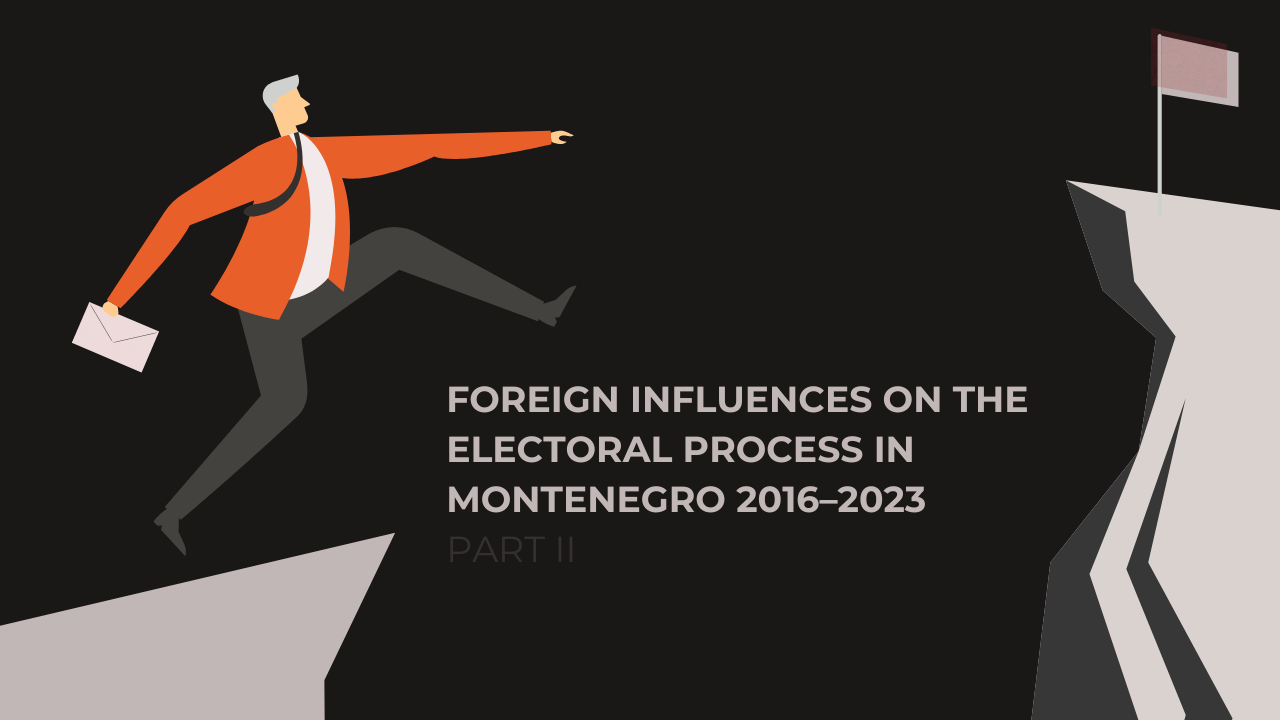Foreign interference in electoral and democratic processes is defined as a set of various and ever-evolving practices, including a mix of disinformation, political financing, strategic advertising, the acquisition of critical infrastructure, cyber-attacks, pressure on researchers, the establishment of new NGOs, and the use of troll networks to instigate disruptive discussions where solutionsoriented discourse should exist.
As observed in the first part of this analysis, a significant number of said instruments and tactics have been used in the last few electoral cycles in Montenegro. While traces of interference in the 2016 parliamentary elections pointed to Russia, in the 2020, 2021, 2022, and 2023 elections, there were numerous evident signs of interference from neighboring countries, notably Serbia.
Montenegro’s legal and institutional framework currently lacks mechanisms to prevent or combat malicious foreign influences. Unlike many democratic countries with robust structures to counter foreign interference, Montenegro remains vulnerable to manipulation and illicit influence of external actors.
Effective protective measures are crucial to safeguarding the sovereignty and autonomy of democratic processes in Montenegro. Without such measures, there is an increased risk that external actors will exploit vulnerabilities within the political, economic, and social structure of the country, undermining the trust and legitimacy of democratic institutions. To uphold democratic principles and ensure transparent governance, Montenegro must devise and implement comprehensive strategies to detect, deter, and counteract ill-intentioned foreign influences. This requires legal reforms and the establishment of institutional capacities tailored to confront the evolving challenges posed by foreign interference in democratic processes.
The European Parliament, for instance, has a Special Committee on Foreign Interference in all Democratic Processes in the European Union, including Disinformation (INGE). However, our proposal to establish a similar committee in the Montenegrin Parliament has yet to be placed on the parliamentary agenda. The INGE Committee’s mandate includes assessing foreign threats across various domains and formulating solutions to thwart attempts at undermining democratic processes.
The Center for Democratic Transition (CDT) advocates for the introduction of mandatory mechanisms for controlling foreign investments (investment screening), where they would be evaluated against national priorities and the national security of the country, including the protection of democratic institutions. This issue is also related to electoral processes because unreported and undocumented revenues of political parties in election campaigns can lead not only to foreign states or criminal organizations but also to business entities that may pay for the costs of corruption to gain privileged status and bypass national regulations through illegal and secret donations to political entities. It is necessary to adopt a new policy for attracting foreign investments and introduce a set of mechanisms to stop the dominance of corrosive capital, which could potentially negatively impact the foreign policy orientation and overall functioning of the state.
Furthermore, to mitigate negative foreign influences, there’s a need to review legislation pertaining to security, information protection, anti-corruption measures (with a focus on lobbying regulations), media laws, and various other sectors, considering the specific nature of these threats.
In this publication, we outline directions for possible interventions in this area within the comprehensive electoral law reform framework.
This publication was produced as part of the project “Electoral Reform in Focus: It’s Time!”, which the Center for Democratic Transition (CDT) is implementing in cooperation with the Association for Responsible and Sustainable Development (UZOR) and the Association of Youth with Disabilities (UMHCG), with the support of the European Union, through the EU Delegation in Montenegro. Its content is the sole responsibility of CDT and does not necessarily reflect the views of the European Union.
We remain open to public dialogue related to the content of our publication, as well as to all well-intended criticism and suggestions.
The publication is available here.
Center for Democratic Transition (CDT)


